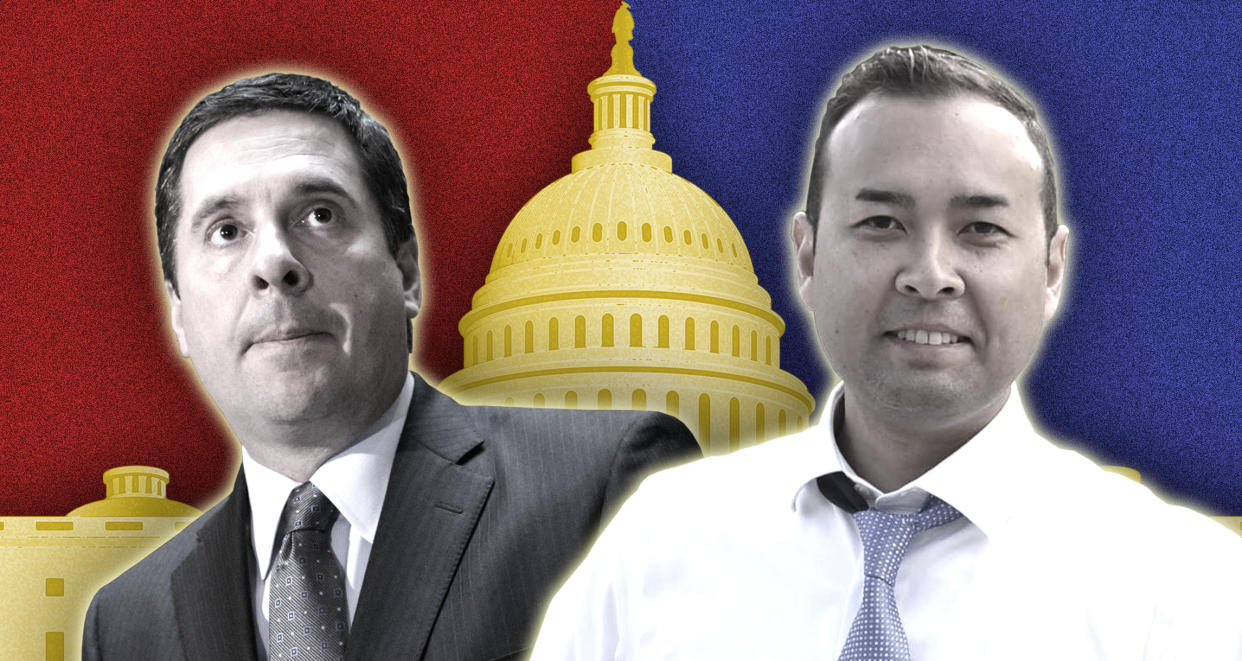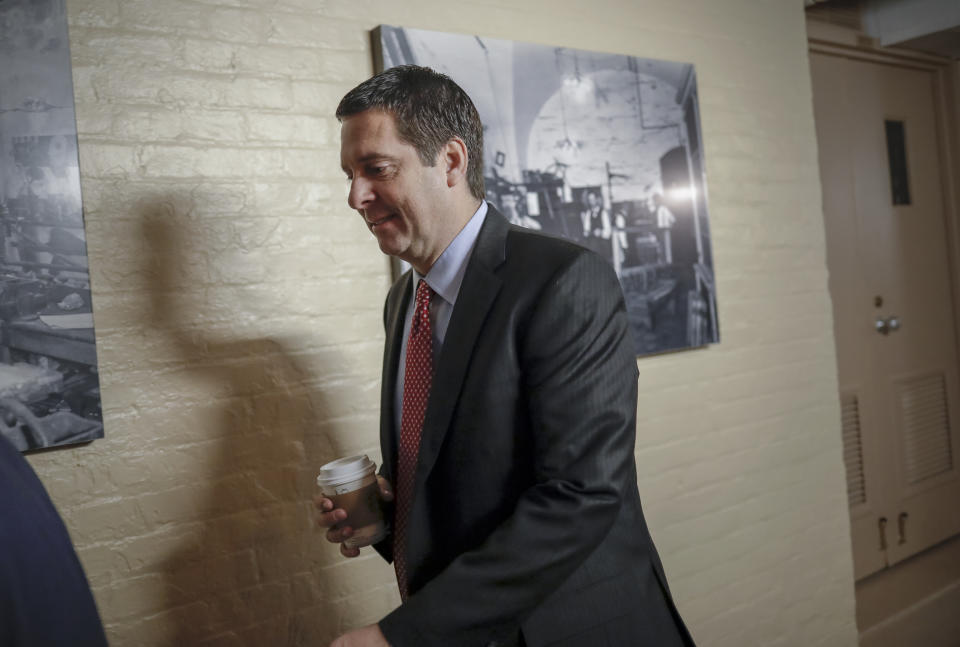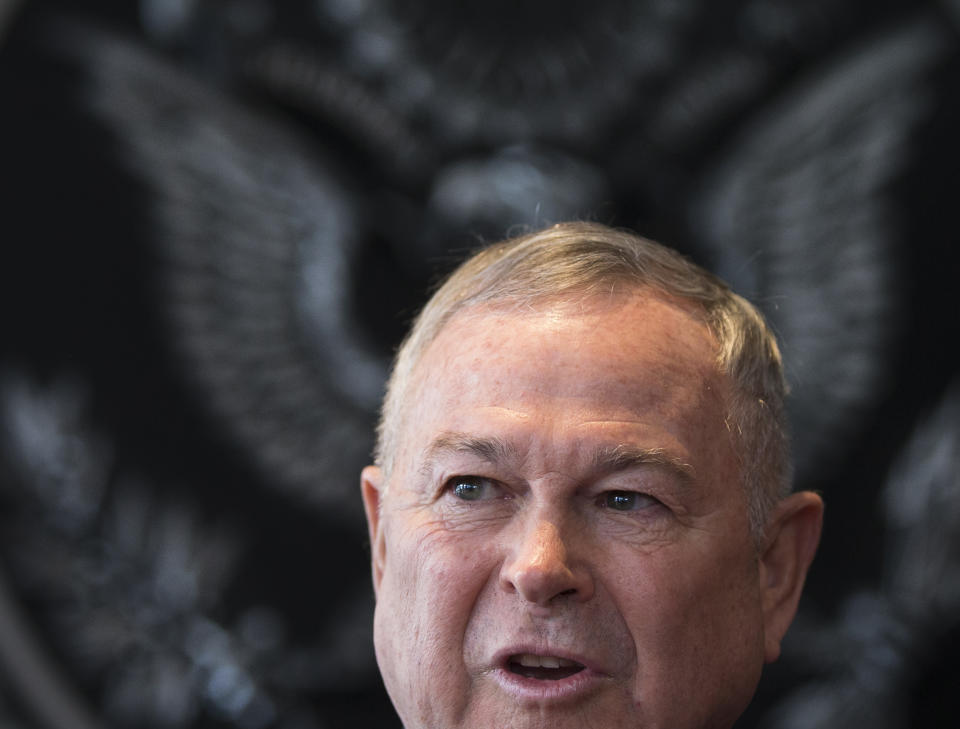Defeating Devin Nunes won't be as easy as bashing his ties to Trump

LOS ANGELES — For months, Rep. Dana Rohrabacher, CA-48, a 15-term veteran whose resolutely pro-Russia views have earned him the nickname “Putin’s favorite congressman,” has been considered one of the most vulnerable Republican incumbents in the country.
But over the course of the past week, Democrats have started openly asking whether some of the same forces that have been working against Rohrabacher could wind up putting another California Republican at risk: Rep. Devin Nunes.
Nunes, CA-22, has certainly been in the news a lot lately. Last March, the Central Valley Republican and House Intelligence chairman seized the national spotlight by accusing the Obama administration of surveilling members of Trump’s transition team — a baseless charge that ultimately forced Nunes to recuse himself from the ongoing House investigation into possible ties between the Trump campaign and Russia. More recently, Nunes has reemerged as the author of a newly declassified memo insinuating that a biased FBI abused U.S. surveillance laws to target President Trump.
On paper, Nunes and Rohrabacher have a lot in common. Both represent California congressional districts with an 11-point GOP registration advantage. Both have gotten tangled up in the controversy surrounding Donald Trump and Russia. Both have attracted polished Democratic challengers with the chops to compete in a general election. And both have progressive activists nationwide salivating about a formerly safe seat the party could potentially flip on its way to winning back control of the House in November.

In response to Nunes’s memo, the congressman’s leading Democratic challenger, Fresno County deputy district attorney Andrew Janz, has raked in $349,410 in donations since the document dropped on Friday, according to his campaign — $100,000 more than he raised in the previous eight months combined. On Thursday, meanwhile, Janz released a scathing anti-Nunes digital ad that has already racked up 600,000 views on social media.
“People here in the Central Valley, we have this perception, and it’s shared across the country, that Congress is broken right now,” Janz tells Yahoo News, echoing the attacks Democrats down South are lobbing at Rohrabacher. “Devin is really at the center of all this. He is the poster boy. He’s out there doing his own thing, advancing his own interests and protecting Donald Trump. He hasn’t held town hall meeting since 2010. That’s too long to go without talking to your constituents.”
Janz’s sudden visibility has Democrats wondering whether Devin could be the next Dana.
But a reality check may be in order. While the similarities between Rohrabacher and Nunes’s reelection battles are striking, the differences may have more to say about the shape of the coming election — and the limits of any potential Democratic comeback.
Take those party registration numbers. In both CA-48 and CA-22, Republicans hold a double-digit registration lead over Democrats. But Orange County Republicans and Central Valley Republicans are two separate species. The former tend to be well-off and well-educated; 41 percent of white O.C. Republicans, for instance, have college degrees. Among their Central Valley counterparts, however, that number is much lower, around 10 percent. As a result, voters in the two districts have very different takes on Trump. In the blue-collar, agricultural 22nd, the president won last November by nine percentage points — while losing to Hillary Clinton in the more genteel 48th. In other words, siding with Trump on Russia is likely to affect Nunes and Rohrabacher very differently.

Then there’s the matter of money. Both Nunes and Rohrabacher have grown accustomed to winning reelection by massive margins, often securing more than 60 percent of the vote against token Democratic opposition. But while Rohrabacher has reacted by becoming a lackadaisical fundraiser, Nunes has gone the opposite route. At the end of 2017, Rohrabacher reported having $713,144 on hand; Nunes reported having $3,844,805.
That’s a big difference, especially when you compare it to what their respective challengers have collected. In the fourth quarter of 2017, for instance, two of Rohrabacher’s Democratic opponents, stem cell pioneer Hans Keirstead ($402,000) and real-estate entrepreneur Harley Rouda ($626,000), raised more than Rohrabacher ($272,000). Rouda currently has more cash on hand as well. Janz, in contrast, ended 2017 with $84,647. Factor in his recent fundraising bonanza and he’s still trailing Nunes by more than $3 million — a very difficult gap to close in one of the poorest parts of California, where big, Orange-County-style donors are few and far between.
Before the latest memo brouhaha, Janz’s campaign commissioned a survey from Public Policy Polling, a Democratic-leaning firm, that showed Nunes only 5 percentage points ahead of a generic Democrat. The results suggested that even then, Nunes might be more vulnerable than previously thought. But there was a telling omission too. The campaign has declined to release the results of a head-to-head match-up between Nunes and Janz, which implies that local voters chose Nunes by a larger margin when given the choice between two real-life candidates.
In conversation, Janz is upbeat about his chances.
“We just have to keep our eye on the ball and realize this is going to be a long, hard slog,” he says. “A lot of Republicans and independents are dissatisfied with what Devin is doing — or not doing. Nobody wants some politician to be in public office for 15 years unchallenged. So I think that a lot of folks, come November, will like the fact that I’m a prosecutor who’s tough on crime. They’ll like that they’ll finally have a real choice.”
When asked about the challenges ahead, however, the candidate pauses for a full five seconds.
Finally, his campaign manager, Heather Greven, steps in. “There are a lot of challenges,” she says. “Andrew is just trying to narrow it down.”
How about Greven, then? What does she see as the biggest challenge?
“Telling our story,” she admits. “There is zero infrastructure up here for a race of this size. We’re really paving our own road.”
Ultimately, Janz’s best shot at staying competitive is if Nunes stays in the news. The more riled up rank-and-file Dems get about Nunes’s antics, the more small donations they will send to his rival (as we saw last weekend). In short, Janz needs to do more than run a strong campaign. He needs to become a national cause célèbre. Anything short of that and even a Democratic wave might not be enough propel him into office.
Read more from Yahoo News:
Yahoo News’ Michael Isikoff describes crucial meeting cited in Nunes memo
The neo-Nazi has no clothes: In search of Matt Heimbach’s bogus ‘white ethnostate’
‘What will it change?’ Rural Iowa has better things to watch than a State of the Union
Photos: Punxsutawney Phil makes annual Groundhog Day prediction


